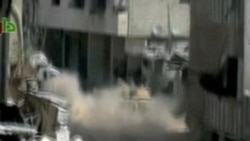WHITE HOUSE —
Syrian groups fighting the government of President Bashar al-Assad are still said to be waiting for weapons the United States pledged last month. But, the arms shipments have not received final approval in Washington.
As Syrian government forces make gains on the ground, the limited lethal aid U.S. President Barack Obama promised the opposition has yet to be sent - almost a month after his announcement.
The issue seems to be Congress, where approval is being stalled while lawmakers debate the types of weapons to send, and to which groups.
White House Press Secretary Jay Carney told reporters Friday the administration has been talking with lawmakers in an effort to settle those questions and speed up approval.
“The fact is, we are working with Congress on the issue of the president’s announcement of enhanced military assistance, but I do not have anything about specific shipments to provide to you," said Carney.
Deciding which groups should receive aid is difficult. Shifting alliances among the groups complicate this decision, according to Michael Rubin at Washington’s American Enterprise Institute.
“There has been a steady radicalization as this debate has been occurring for the last two years, and so the opposition which we looked at back a year, a year-and-a-half ago, when we had this debate, is not the same opposition that starts today. The opposition has become steadily more radical," said Rubin.
Rubin says another question is which arms the opposition wants and whether the U.S. is willing to provide them.
“What the Syrian opposition wants is a qualitative military edge. They want, for example, surface-to-air missiles, and that raises a whole new set of political questions about whether or not we think that the Syrian opposition should have them, whether, when push comes to shove, we trust the Syrian opposition not to turn on us or our allies," he said.
Russia acknowledged in May that it has agreed to sell advanced air defense missiles to the Assad government. It is not clear whether the missiles have been delivered.
The Iranian-backed group Hezbollah, which the United States considers a terrorist organization, is also supporting the Syrian government.
These developments, and gains by rebel groups said to be affiliated with al-Qaida, have some experts wondering whether any U.S. help for the opposition will be too little, too late.
As Syrian government forces make gains on the ground, the limited lethal aid U.S. President Barack Obama promised the opposition has yet to be sent - almost a month after his announcement.
The issue seems to be Congress, where approval is being stalled while lawmakers debate the types of weapons to send, and to which groups.
White House Press Secretary Jay Carney told reporters Friday the administration has been talking with lawmakers in an effort to settle those questions and speed up approval.
“The fact is, we are working with Congress on the issue of the president’s announcement of enhanced military assistance, but I do not have anything about specific shipments to provide to you," said Carney.
Deciding which groups should receive aid is difficult. Shifting alliances among the groups complicate this decision, according to Michael Rubin at Washington’s American Enterprise Institute.
“There has been a steady radicalization as this debate has been occurring for the last two years, and so the opposition which we looked at back a year, a year-and-a-half ago, when we had this debate, is not the same opposition that starts today. The opposition has become steadily more radical," said Rubin.
Rubin says another question is which arms the opposition wants and whether the U.S. is willing to provide them.
“What the Syrian opposition wants is a qualitative military edge. They want, for example, surface-to-air missiles, and that raises a whole new set of political questions about whether or not we think that the Syrian opposition should have them, whether, when push comes to shove, we trust the Syrian opposition not to turn on us or our allies," he said.
Russia acknowledged in May that it has agreed to sell advanced air defense missiles to the Assad government. It is not clear whether the missiles have been delivered.
The Iranian-backed group Hezbollah, which the United States considers a terrorist organization, is also supporting the Syrian government.
These developments, and gains by rebel groups said to be affiliated with al-Qaida, have some experts wondering whether any U.S. help for the opposition will be too little, too late.





